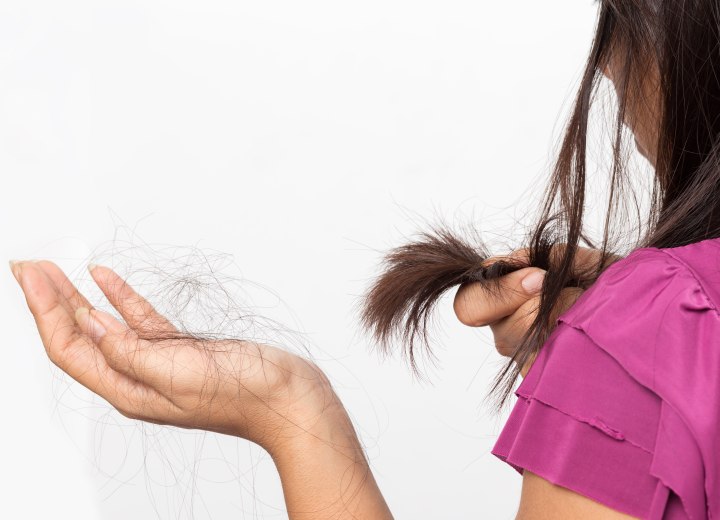Cause for Hair Loss

A: While everyone loses around 40 hairs every day in the hair's natural growth and shedding cycle, it sounds as though you are experiencing something more significant in the amount of hair you are shedding. Most women report experiencing approximately 40% hair loss by the age of 60, but regardless of age, for a woman, dealing with hair loss is stressful and upsetting.
Being prepared by having as much information as you possibly can before talking to your doctor will help him make better determinations regarding the potential causes for the loss, and will help him better determine whether the cause is hereditary (genetic), environmental, or medical (infection, or hormonal).
Here are some questions you should ask yourself so that you can have the answers ready for your doctor:
1. How long have you been noticing the hair loss?
2. Is the hair loss more prevalent in one or more areas of the scalp?
3. Have you noticed any increase in hair growth on other parts of the body/face?
4. Have you been taking any medications or dietary supplements, or were you suffering from any illnesses prior to noticing the loss of hair?
5. Have you had any change in your environment prior to noticing the loss of hair, i.e. moved to a new location, new job environment, etc.?
6. Have you changed your diet prior to noticing the hair loss?
7. Are there any women (or men) in your family, whom have experienced similar hair loss?
8. Have you made any changes in your hair care routine prior to noticing the hair loss?
There are a lot of causes for hair loss among women. Some of these causes will typically have secondary symptoms that accompany the hair loss, such as redness, irritation, inflammation, sensitivity, and itchiness of the scalp, in addition to scaly and/or flakiness of the scalp. The problem could be as simple as an allergic reaction, an infection (though these almost always have other symptoms as well as the hair loss).
It could also be more complicated problems like alopecia or hormonal imbalance. These may or may not have secondary symptoms, and can be difficult to diagnose and treat. If your doctor is unable to offer you any help, or if you feel he or she is not taking your concern seriously, ask for a referral to a dermatologist or find one on your own. A dermatologist's field of study is more specific to skin and hair and he or she should have more experience and be better acquainted with the type of problem you are having.
You asked specifically about the frequency with which you wash your hair (whether it is too often) and its relationship to the hair loss. I do want to at least calm your concerns about that. You should wash your hair often enough to keep your scalp clean. For some people daily shampooing is needed, while for others shampooing once a week may be enough. Unless you are experiencing a reaction to the products you are using to shampoo your hair, this should not cause your hair loss.
Your complaint of an oily scalp and dry ends is a common one. If shampooing every other day gives you the results you desire, you can feel free to continue that routine. However, I can offer you the following tips as well: You can use witch hazel on a cotton ball or cosmetic pad and apply it to your scalp to remove excess oils. Witch hazel is a gentle astringent that won't damage your hair.
Also, if after you have shampooed and conditioned your hair you follow the warm water rinsing with a cool water rinse you will tighten the pores of the scalp and help reduce the production of oils for a time. This can help to reduce the oily scalp problem.
As for the dry ends, use a leave-in spray conditioner on the ends of your hair only before styling and you might also want to add a spray on anti-frizz shine enhancer to protect against heat styling damage and keep the ends of your hair looking shiny and smooth. (I personally use Infusium 23 leave-in conditioner and CitriShine Spray Laminator with my clients, who love the results.)
©hairfinder.com